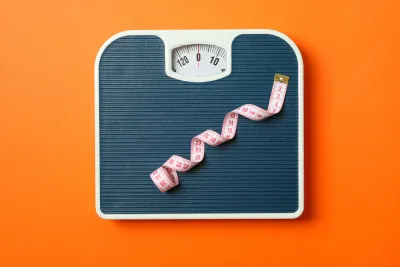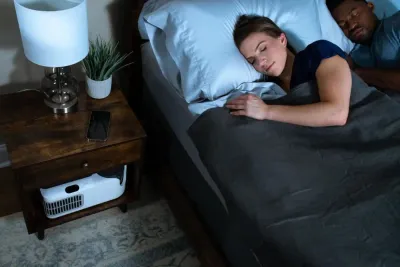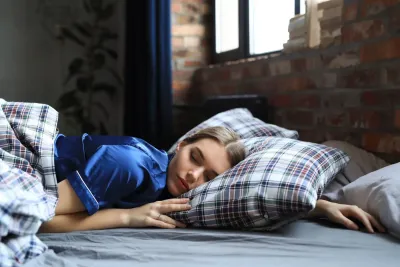
Key Takeaways
Sleeping in a colder environment may cause a small increase in calorie burn, but the effect is modest and should not be viewed as a weight loss strategy.
- Cooler sleep temperatures can activate brown fat, a type of fat that helps burn calories to keep your body warm.
- Brown fat increases energy use during sleep by generating heat, which can slightly raise metabolic activity overnight.
- Cool environments encourage thermogenesis, a process linked to better glucose regulation and fat metabolism.
- Beyond calories, cooler sleep supports deeper sleep stages and more effective overnight recovery.
- Bed cooling systems make it easier to maintain an optimal sleep temperature without adjusting the whole room.
It's staggering what we are willing to do to maintain or lose weight and stay in shape. Over 55 million people belong to health and fitness centers across the United States. These clubs generate a whopping $25 billion a year.
This is just the beginning.
An article in Consumer Reports says while memberships in clubs are growing, two-thirds of us prefer to work out at home, spending billions more on treadmills and exercise equipment. [1] In addition, it is estimated that billions more are spent on dietary supplements and meal replacement plans to lose weight.
Why are we spending so much time, money, and effort on weight loss when the answer may simply lie in better sleep?
You've likely heard that sleeping in a cooler environment can improve sleep quality. But did you know it might also help you shed those extra pounds, especially around the belly? This blog post delves into the fascinating connection between sleeping cold and belly fat burn, exploring the science behind this intriguing claim.
How Calories Burn During Sleep Actually Works
Sleeping is a complex process that involves various bodily functions, including burning calories. While it’s true that you burn more calories while awake, your body still uses energy to maintain basic functions during sleep.
We’ll explore the factors that affect the basal metabolic rate (BMR) and how it relates to calories burned while sleeping.
What Factors Affect the Basal Metabolic Rate?
The basal metabolic rate (BMR) is the number of calories your body burns at rest, including while sleeping. Several factors can impact your BMR, including:
- Age: As you age, your BMR tends to decrease, which means you burn fewer calories at rest.
- Sex: Men generally have a higher BMR than women, which means they burn more calories at rest.
- Weight: Your body weight can affect your BMR, with more muscle mass leading to a higher BMR.
- Height: Your height can also impact your BMR, with taller individuals tending to have a higher BMR.
- Body Composition: Your body composition, including muscle mass and body fat percentage, can affect your BMR.
Understanding these factors can help you better grasp how many calories you burn while sleeping and how your body weight and composition play a role in your overall energy expenditure.
For a better understanding, GNC wrote a blog describing what can affect your basal metabolic rate.
Do You Burn Calories When You Sleep?
Yes, you do burn calories when you sleep. While the number of calories burned is relatively small compared to calories burned while awake, it’s still an important aspect of your overall energy expenditure.
On average, a person burns around 50 calories per hour while sleeping, which translates to around 400 calories per 8-hour sleep period. This calorie burning is important for maintaining basic bodily functions and contributes to your total daily energy expenditure.
Did You Know: Brown fat burns calories to generate heat, which may actually assist in weight loss.
Start Sleeping Cooler and Feel the Difference
Ready to experience cooler, more comfortable sleep? Feel the difference with the Chilipad.
Does Sleeping Cold Actually Burn More Calories
A study published in the journal “Diabetes” suggests that sleeping in cooler temperatures offers benefits and can help us attack belly fat while we sleep.
When you first fall asleep, you enter the initial stages of sleep, which are crucial for setting the stage for effective calorie burning during sleep. Belly fat is considered “white fat”, the type of fat we want to reduce.
“Brown fat” is considered good fat and is found in much smaller amounts. Brown fat helps improve our metabolism and assists the body in losing weight.
Participants in the study maintained their normal daily habits over four months but each evening returned to sleep in temperature-controlled chambers.
Researchers kept sleeping rooms at a neutral 75 degrees for the first month and, in the following month, reduced temperatures to 66 degrees.
For the third month, temperatures were returned to the neutral temperature of 75 degrees before being increased to a warm temperature of 81 degrees for the final month. The amount of brown fat was measured after each month during the study.
The results were that the colder temperatures noticeably changed the participant’s bodies. After the month of sleeping at the colder 66-degree temperatures, volumes of good or brown fat had almost doubled.
Does being cold burn fat? The study found that they had indeed lost belly fat from sleeping cold.
It is important to note that sleeping cold is not sleeping at shivering temperatures, and shivering is not the way you lose weight while sleeping cold. Even at neutral temperatures, you’ll burn a number of calories based on your body weight.
Sleep-Deprived and Calories
Sleep loss leads to temporary increases in calorie burning and long-term health issues, such as weight gain and obesity. The negative effects of sleep deprivation on hormone regulation, specifically cortisol's role in appetite increase and glucose regulation, ultimately link chronic sleep loss to metabolic diseases like type 2 diabetes. Therefore, adequate sleep is crucial for effective weight management.

How Many Calories You Really Burn Overnight?
Does sleeping burn calories? The answer is yes! According to Livestrong, the following are some examples:
- A 200-pound person burns 86 calories per hour, or 688 for eight hours.
- If you weigh 160 pounds, you burn approximately 69 calories per hour while sleeping. That would add up to 552 calories while you sleep for eight hours
- If you are a 120-pound person, you’ll burn 51 calories per hour while sleeping.
Part of what the survey discovered is that sleeping cold increases REM sleep. This can burn as much as 140 extra calories per night while sleeping.
That can be significant because over a year it can lead to losing as much as 14 pounds. So, being cold and sleeping cold to a degree has been proven to burn calories.
Note: Calories burned while sleeping depend on their personal BMR. (Basal Metabolic Rate)
How Significant Is the Calorie Burn
While sleeping in a cooler environment may slightly increase calorie burn, the effect is small and highly individual. For most people, the difference is modest and should not be viewed as a meaningful weight loss tactic.
Calorie response to cold varies based on factors like body composition, metabolism, and how cold the environment actually is. Some people may see a minor uptick, while others notice little to no change.
It is also important to keep expectations realistic. The number of calories burned during cold sleep is not comparable to exercise or daily movement.
The bigger benefit comes from improved sleep quality, which plays a much larger role in metabolic health, hormone balance, and recovery.
Note: Most experts recommend a sleep environment between 60 and 67 degrees Fahrenheit for comfort and sleep quality.
Simple Ways to Sleep Cool Without Shivering
Sleeping cold has been demonstrated to provide weight loss benefits, improve memory, reduce stress, and add physical strength and overall health and immunity.
Bed Cooling Systems
Sleeping cooler is easier than ever with the Chilipad Dock Pro, best bed cooling system, and Cube Sleep Systems, the original bed cooler.
This smart mattress technology lets you adjust your sleep temperature for optimal comfort throughout the night.
Each uses advanced water-based cooling technology. The systems regulate your bed’s temperature, helping to reduce overheating and improve sleep quality. Whether you need a cool retreat on warm nights or precise temperature control for restorative rest, these cooling systems provide a personalized and refreshing sleep experience.
Temperature-Regulated Sheets
Another way to keep your body cooler at night is to have cooling sheets. These temperature-regulating sheets move moisture quickly away from the body, creating a cooler, more comfortable sleeping environment.
The Bottom Line on Cold Sleep
Sleeping in a cooler environment may slightly increase calorie burn, but the real benefit is better sleep, not weight loss. Consistent, high-quality sleep supports metabolic health, hormone balance, and recovery far more than temperature alone.
If heat disrupts your sleep, precise sleep temperature control can help you sleep more deeply and stay asleep longer.
Frequently Asked Questions About Cold Sleep and Calories
Does Sleeping in the Cold Really Burn More Calories?
Yes, but don’t expect to torch a cheeseburger overnight. When you're cold, your body works harder to maintain core temperature, which can increase calorie burn—especially if brown fat gets activated.
What Is Brown Fat and Why Does It Matter?
Brown fat is like your body's internal furnace. It burns energy to create heat, helping regulate body temperature—and yes, that means more calorie burn while you sleep cold.
What Are the Benefits of Sleeping in a Cooler Environment?
- Slight increase in calorie expenditure
- Better melatonin production
- Improved sleep quality and duration
- Potential for reduced stress hormones
- More stable blood sugar levels overnight
Does sleeping cold burn fat?
Sleeping cold may cause a very small increase in calorie burn, but it does not directly burn body fat. Any effect is modest and varies widely from person to person.
Is cold sleep good for weight loss?
Cold sleep alone is not a weight loss strategy. The bigger benefit is better sleep quality, which supports hormone balance, appetite control, and overall metabolic health.
Can a cold room boost metabolism?
A cooler environment may slightly increase metabolic activity due to thermoregulation, but the impact is minimal. It should not replace movement, nutrition, or exercise.
Peer-Reviewed Research References
-
Friedman, Lauren.
Find the Right Exercise Equipment during Holiday Sales.
Consumer Reports, November 20, 2018.
Source Type: Consumer Advocacy & Product Guidance
Key Insight: Provides expert-backed guidance on evaluating exercise equipment during major sales periods, emphasizing safety, durability, space considerations, and long-term usability over short-term discounts — helping consumers make informed, health-focused purchasing decisions.
Publisher: Consumer Reports









